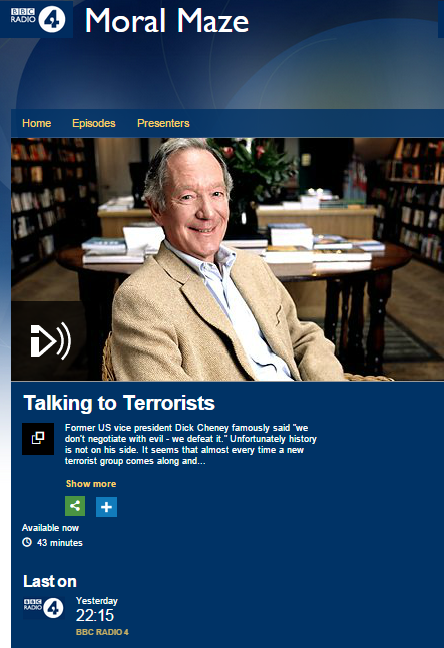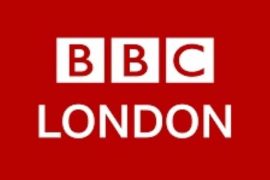The October 15th edition of the BBC Radio 4 programme ‘Moral Maze’ – repeated on October 18th and available here – was titled “Talking to Terrorists”. The synopsis on the programme’s web page reads as follows:
“Former US vice president Dick Cheney famously said “we don’t negotiate with evil – we defeat it.” Unfortunately history is not on his side. It seems that almost every time a new terrorist group comes along and we declare we’ll never negotiate with them, we end up doing just that. The IRA, the PLO, Taliban, Hamas to name a few – we’ve eventually talked to them all. So why not talk to ISIS? Policymakers understandably respond with righteous anger and determination after a horrible event. Negotiations can give legitimacy to terrorists and their methods and set a dangerous precedent. Yet terrorists are rarely, if ever, defeated by military means alone. ISIS may seem to be well beyond the pale at the moment, but will that always be the case? And how do we make that judgement? A former director of the Israeli security agency Shin Bet has said he’d advocate talking to anyone – even the Iranians. That way, he said “we discover they don’t eat glass and they that we don’t drink petrol.” Are people’s lives being sacrificed as conflicts drag on because we refuse to talk to preserve our moral purity? Or do we have to take a stand between right and wrong, good and evil when it comes to a group such as ISIS? Should we – can we – balance the forces of pragmatism and principle when it comes to the prospect of talking to terrorists?”
Most of the programme focused on ISIS which interestingly was described by presenter Michael Buerk as follows in his introduction:
“They’re painted with some reason as fanatics, operating on the border line between Salafist extremism and religious insanity – beyond the reach of reason.” [emphasis added]
Contrary to the impression perhaps received by readers of the synopsis there was actually very little content relating to Israel, with the exception being a couple of ‘gems’ from Michael Portillo.
“So you wouldn’t say then that the terrible things they’ve [ISIS] done – Michael Buerk listed some of them at the beginning – you wouldn’t say that that uniquely sets them apart, let’s say from Zionist terrorists…eh….who formed the State of Israel, Hamas with whom we want Israel now to speak, the Taliban with whom we have all spoken – so it doesn’t set them apart?”
“But might it also be an interesting paradox that as we come under such pressure from Islamic State that we’ll want to settle whatever we can in the region, so actually we’ll probably be pressuring Israelis to talk to the formerly demonised Hamas?” [emphasis added]
What is interesting about this programme is the glimpse it gives those of us in the Middle East into the kind of conversations among intellectuals and policy shapers in the West. Especially notable was the notion proposed by two participants that ISIS fighters are essentially frustrated Sunnis expressing their discontent with a Shia-run Iraqi government and that if that was sorted out, the ISIS balloon might be deflated.
Another remarkable point was the following argument from Michael Portillo:
“I’m amazed that in this whole discussion more weight has not been given to the impact over the last ten years or so [….] of Western violence. Now that is not to say that there is moral equivalence, but it is to say that one of the reasons why I think people are being very violent in these countries is that so much violence has happened in these countries. The alternative to violence is talk.”
As is so often the case, the really interesting aspect of this programme was what was not discussed and notably the topics of the age-old Shia-Sunni conflict and political Islam were not brought into the discussion at all.
Dr Jonathan Spyer recently wrote the following:
“Because the nature of this struggle is not widely grasped in the West, policy appears somewhat rudderless. This is reflected in the current discussion regarding the response to the Islamic State.
First, Assad was the enemy. This was made clear enough not only by his support for Hezbollah and attempts to nuclearize, but also by his unspeakable brutality and use of chemical weapons against his own citizens.
Then, when the brutality of some of the rebels became apparent, Western public interest in supporting the rebels receded. Soon the I.S. emerged as the new bogeyman. Declarations for its destruction became de rigueur, though it is far from clear how this is going to be carried out—and a de facto alliance with Iran and its clients, at least in Iraq, has emerged. This was seen in the expulsion of the I.S. from the town of Amerli, a pivotal moment in the major setbacks faced by the organization in recent days. In that town, Shi’ite militias were backed by American air power—to telling effect against the Sunni jihadis.
But is it really coherent policy to be backing murderous Shi’ite sectarians against murderous Sunni ones? It is not. Of course, when the West backs the Sunni rebels in Syria, the precise opposite is happening. Weaponry donated to “moderate” rebels then inevitably turns up in the hands of Sunni jihadis, who do most of the fighting associated with the Syrian “rebellion.” The result is that in Iraq the U.S. is helping one side of the Sunni-Shia war, and in Syria it’s helping the other side.
Only when it is understood that the West cannot partner with either version of political Islam does it become possible to formulate a coherent policy toward the Sunni jihadi forces, on the one hand, and toward the Iran-led bloc, on the other.”
Dr Spyer’s article – which, like this BBC programme, gives little cause for optimism that the West will come out of its Middle East ‘moral maze’ anytime soon – can be read here.



